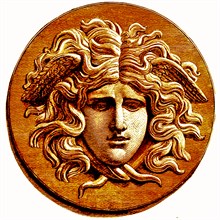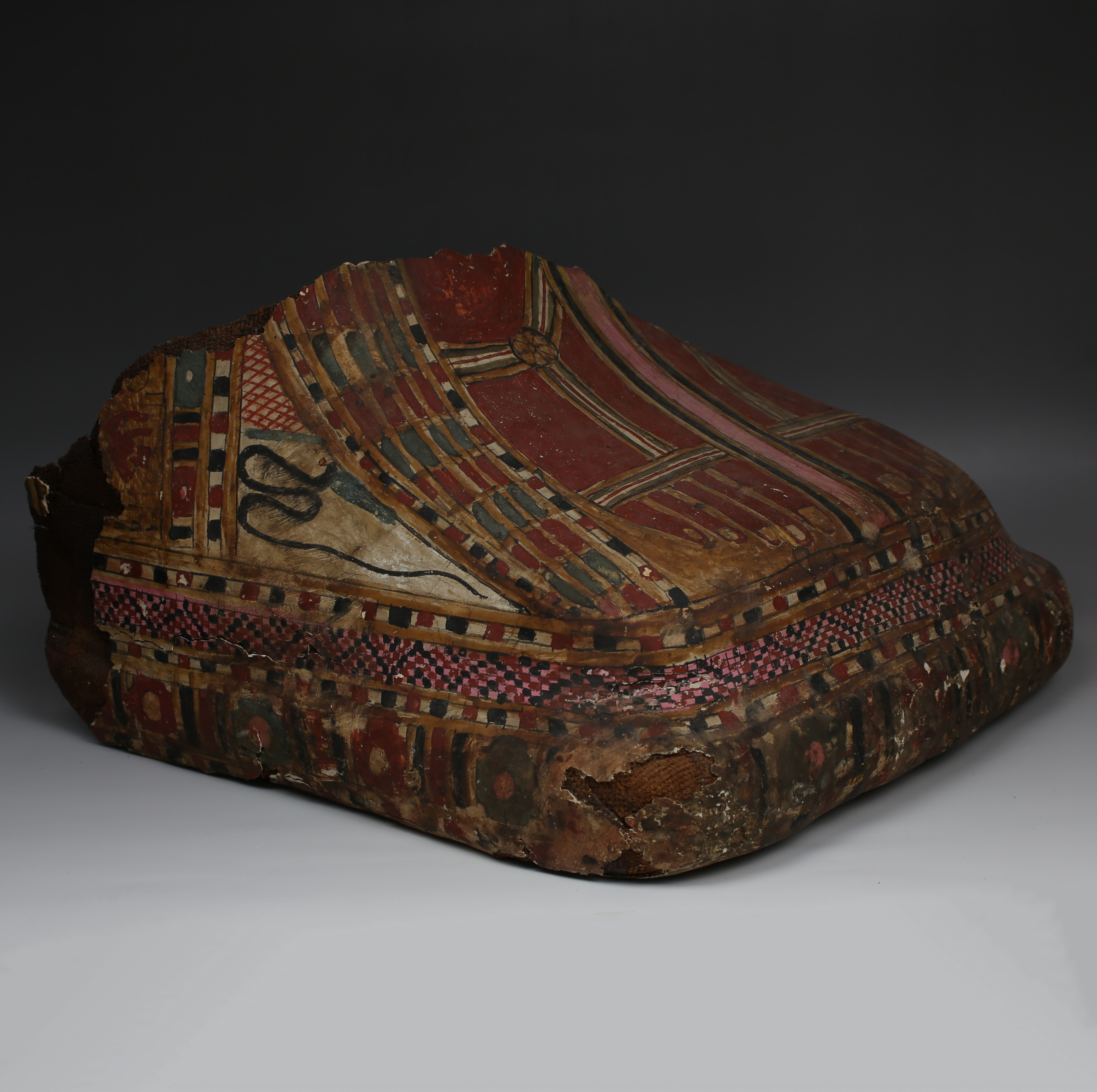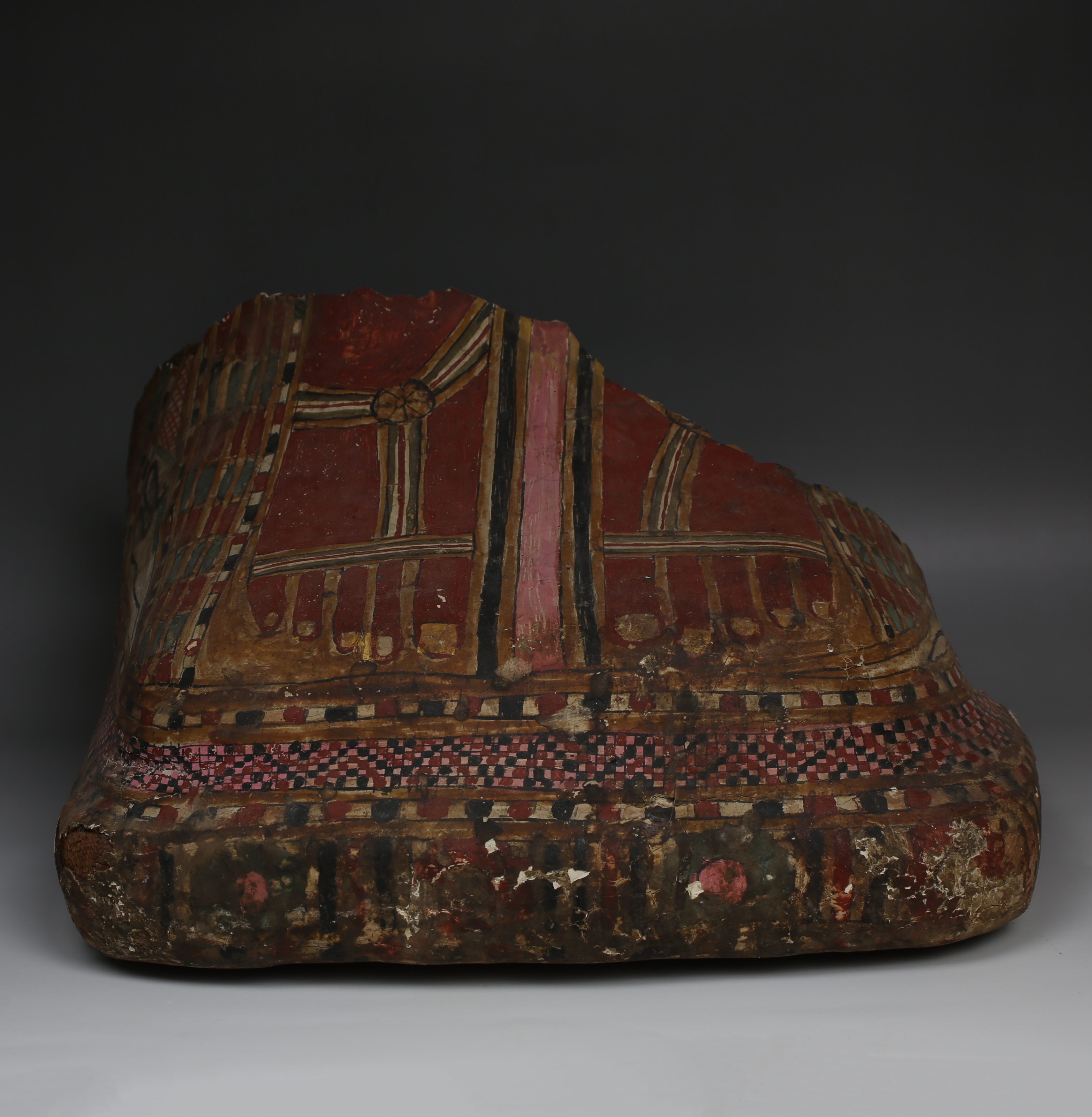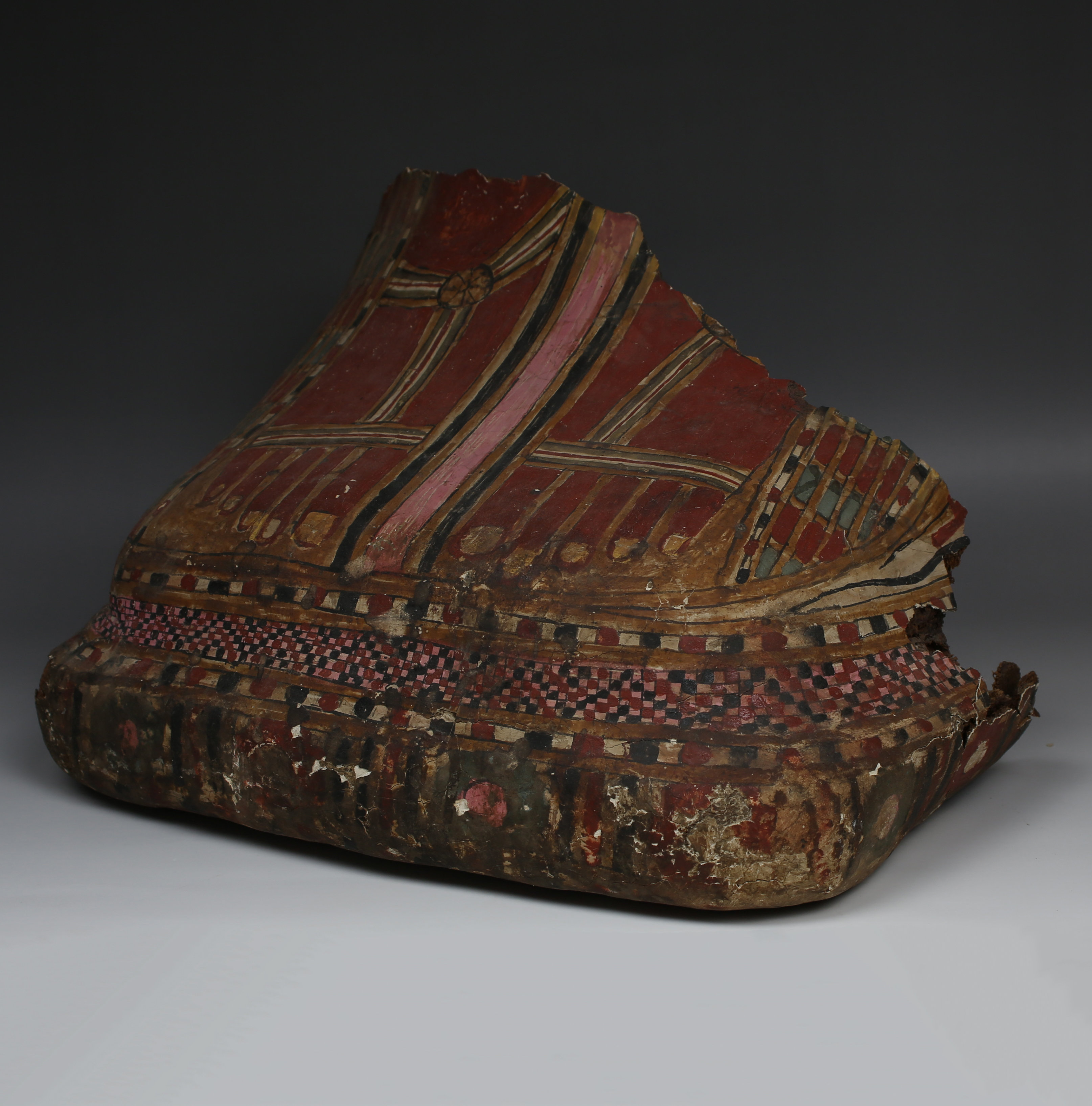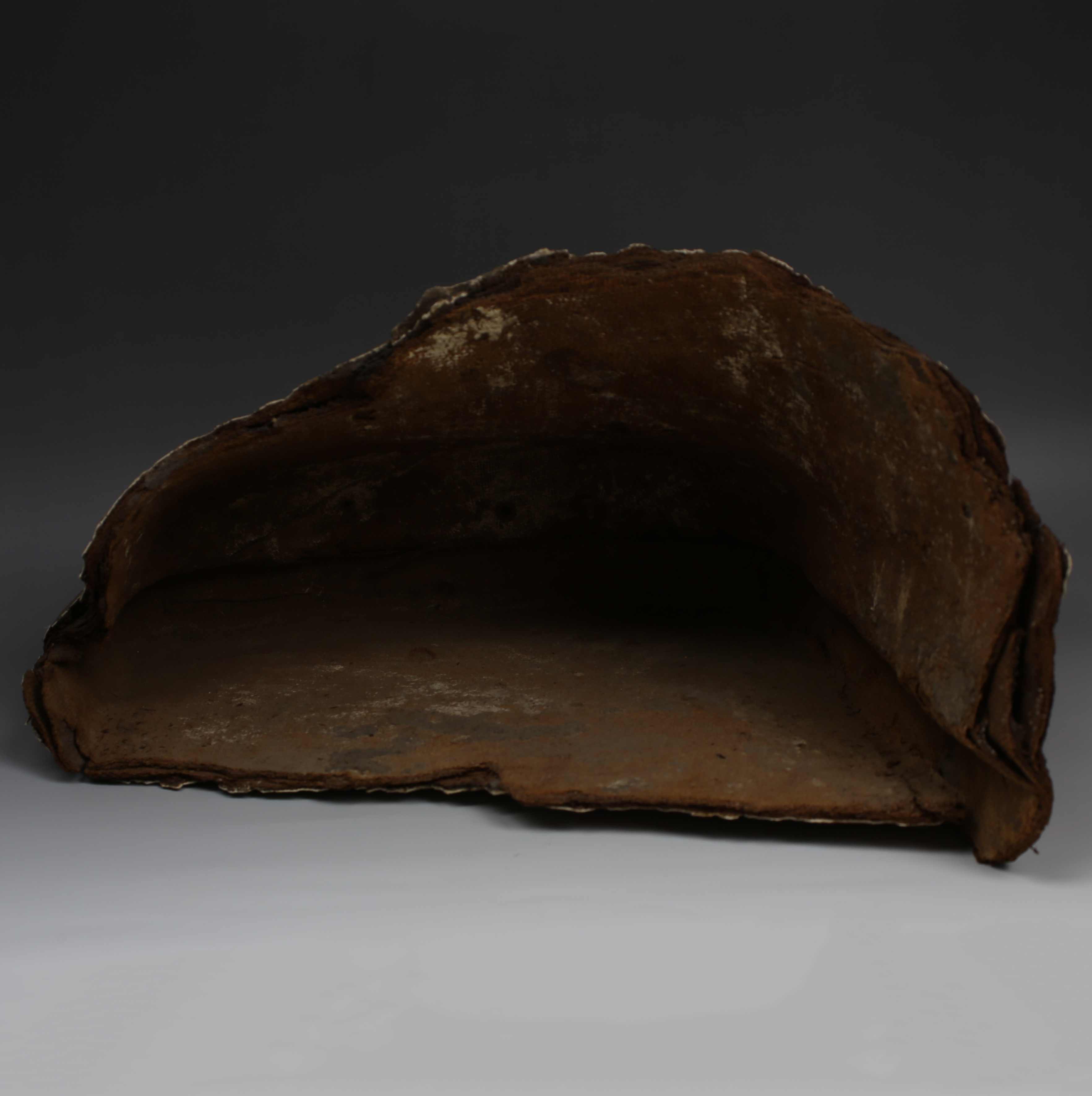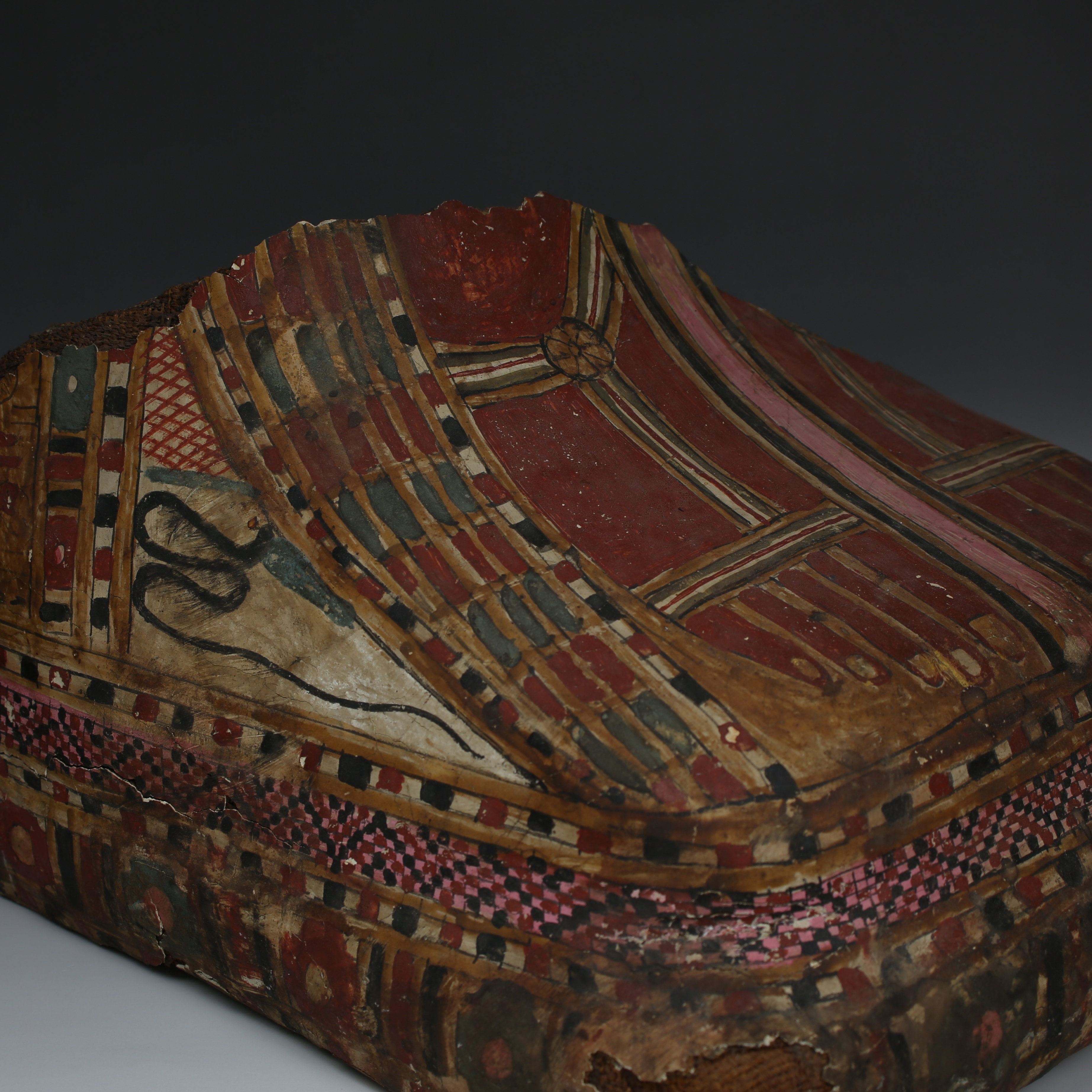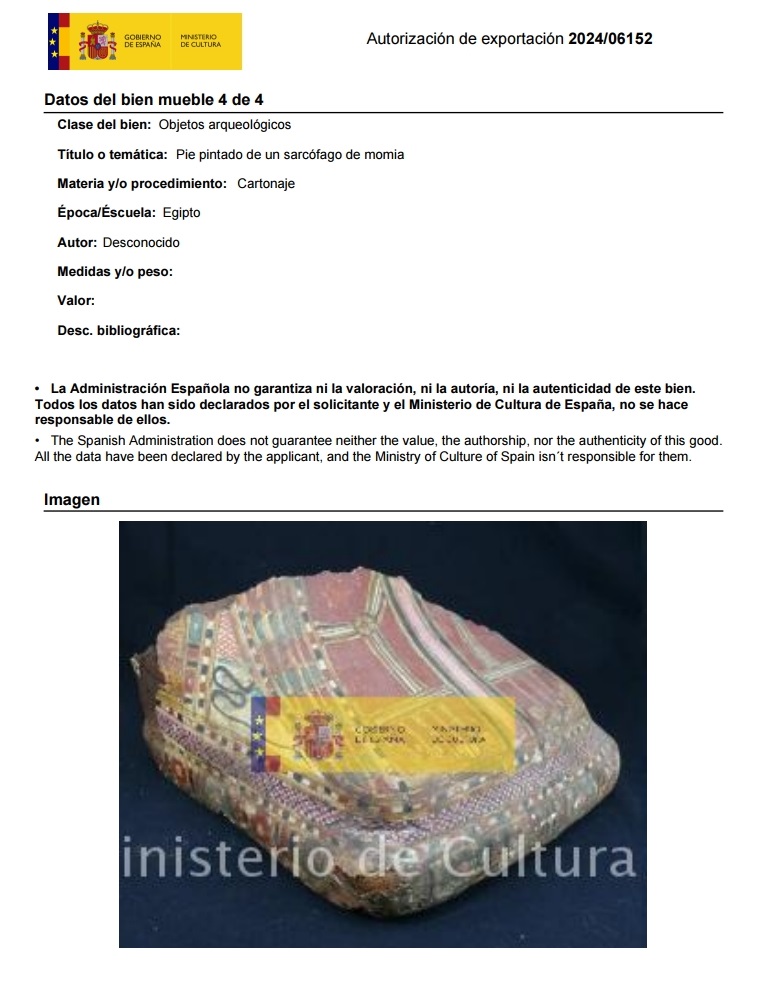001
Egyptian painted cartonnage foot from a mummy sarcophagus
MATERIAL: Linen and Gesso
CULTURE: Egyptian
PERIOD: Ptolemaic period, 3rd - 1st Century B.C
DIMENSIONS: 180 mm x 290 mm x 290 mm
CONDITION: Good condition
PROVENANCE: Ex French private collection, collector and antiques dealer, acquired before the 1990s
Comes with Certificate of Authenticity and Export Licence. If you are from outside the European Union, we will have to apply for the export licence again for your country, this takes 3 to 5 weeks and has a cost of 5% of the hammer price, this amount will be added to the final invoice.
The Ptolemaic Kingdom was an Ancient Greek state based in Egypt during the Hellenistic Period. It was founded in 305 BC by Ptolemy I Soter, a companion of Alexander the Great, and lasted until the death of Cleopatra VII in 30 BC. Ruling for nearly three centuries, the Ptolemies were the longest and most recent Egyptian dynasty of ancient origin.
Alexander the Great conquered Persian-controlled Egypt in 332 BC during his campaigns against the Achaemenid Empire. After Alexander’s death in 323 BC, his empire quickly unraveled amid competing claims by the diadochi, his closest friends and companions. Ptolemy, a Macedonian who was one of Alexander’s most trusted generals and confidants, won control of Egypt from his rivals and declared himself pharaoh. Alexandria, a Greek polis founded by Alexander, became the capital city and a major center of Greek culture, learning, and trade for the next several centuries. Following the Syrian Wars with the Seleucid Empire, a rival Hellenistic state, the Ptolemaic Kingdom expanded its territory to include eastern Libya, the Sinai, and northern Nubia.
To legitimize their rule and gain recognition from native Egyptians, the Ptolemies adopted the title of the pharaoh and had themselves portrayed on public monuments in Egyptian style and dress; otherwise, the monarchy rigorously maintained its Hellenistic character and traditions. The kingdom had a complex government bureaucracy that exploited the country’s vast economic resources to the benefit of a Greek ruling class, which dominated military, political, and economic affairs, and which rarely integrated into Egyptian society and culture. Native Egyptians maintained power over local and religious institutions, and only gradually accrued power in the bureaucracy, provided they Hellenized. Beginning with Ptolemy II Philadelphus, the Ptolemies began to adopt Egyptian customs, such as marrying their siblings per the Osiris myth, and participating in Egyptian religious life. New temples were built, older ones restored, and royal patronage lavished on the priesthood.
From the mid third century BC, Ptolemaic Egypt was the wealthiest and most powerful of Alexander’s successor states, and the leading example of Greek civilization. Beginning in the mid second century BC, dynastic strife and a series of foreign wars weakened the kingdom, and it became increasingly reliant on the Roman Republic. Under Cleopatra VII, who sought to restore Ptolemaic power, Egypt became entangled in a Roman civil war, which ultimately led to its conquest by Rome as the last independent Hellenistic state. Roman Egypt became one of Rome’s richest provinces and a center of Macedonian culture, with Greek remaining the main language of government until the Muslim conquest in 641 AD. Alexandria remained one of the leading cities of the Mediterranean well into the late Middle Ages.
MATERIAL: Linen and Gesso
CULTURE: Egyptian
PERIOD: Ptolemaic period, 3rd - 1st Century B.C
DIMENSIONS: 180 mm x 290 mm x 290 mm
CONDITION: Good condition
PROVENANCE: Ex French private collection, collector and antiques dealer, acquired before the 1990s
Comes with Certificate of Authenticity and Export Licence. If you are from outside the European Union, we will have to apply for the export licence again for your country, this takes 3 to 5 weeks and has a cost of 5% of the hammer price, this amount will be added to the final invoice.
The Ptolemaic Kingdom was an Ancient Greek state based in Egypt during the Hellenistic Period. It was founded in 305 BC by Ptolemy I Soter, a companion of Alexander the Great, and lasted until the death of Cleopatra VII in 30 BC. Ruling for nearly three centuries, the Ptolemies were the longest and most recent Egyptian dynasty of ancient origin.
Alexander the Great conquered Persian-controlled Egypt in 332 BC during his campaigns against the Achaemenid Empire. After Alexander’s death in 323 BC, his empire quickly unraveled amid competing claims by the diadochi, his closest friends and companions. Ptolemy, a Macedonian who was one of Alexander’s most trusted generals and confidants, won control of Egypt from his rivals and declared himself pharaoh. Alexandria, a Greek polis founded by Alexander, became the capital city and a major center of Greek culture, learning, and trade for the next several centuries. Following the Syrian Wars with the Seleucid Empire, a rival Hellenistic state, the Ptolemaic Kingdom expanded its territory to include eastern Libya, the Sinai, and northern Nubia.
To legitimize their rule and gain recognition from native Egyptians, the Ptolemies adopted the title of the pharaoh and had themselves portrayed on public monuments in Egyptian style and dress; otherwise, the monarchy rigorously maintained its Hellenistic character and traditions. The kingdom had a complex government bureaucracy that exploited the country’s vast economic resources to the benefit of a Greek ruling class, which dominated military, political, and economic affairs, and which rarely integrated into Egyptian society and culture. Native Egyptians maintained power over local and religious institutions, and only gradually accrued power in the bureaucracy, provided they Hellenized. Beginning with Ptolemy II Philadelphus, the Ptolemies began to adopt Egyptian customs, such as marrying their siblings per the Osiris myth, and participating in Egyptian religious life. New temples were built, older ones restored, and royal patronage lavished on the priesthood.
From the mid third century BC, Ptolemaic Egypt was the wealthiest and most powerful of Alexander’s successor states, and the leading example of Greek civilization. Beginning in the mid second century BC, dynastic strife and a series of foreign wars weakened the kingdom, and it became increasingly reliant on the Roman Republic. Under Cleopatra VII, who sought to restore Ptolemaic power, Egypt became entangled in a Roman civil war, which ultimately led to its conquest by Rome as the last independent Hellenistic state. Roman Egypt became one of Rome’s richest provinces and a center of Macedonian culture, with Greek remaining the main language of government until the Muslim conquest in 641 AD. Alexandria remained one of the leading cities of the Mediterranean well into the late Middle Ages.
Auction 4 of Ancient Art
Sale Date(s)
Venue Address
3. EXPORT LICENSES: All pieces have the corresponding export license to be shipped out of Spain.
3.1 For bidders from the European Union, it is not necessary to apply for any additional export license, as the one included in the piece is valid.
3.2 For bidders outside the European Union it will be necessary to apply again for an export license for your country, this usually takes from 4 weeks to 6 weeks and has a cost of 5% of the auction price. This cost will be added to the final price of each lot purchased.
8. The shipment, in general, take place within the three days following the receipt of payment, except in cases of agreement between both parties, in which case the client will be informed of the exact date and the means of dispatch. In the case where the country of destination is not Europe, the dispatching of the piece will take place in the same conditions stated, but counting from the receipt of the corresponding export permission issued by the Spanish authorities.
8.1. If you win more than one item, we can do a combined shipment and you will not be charged extra for it, unless one of the pieces won makes shipping more expensive.
8.2. Items will be shipped only upon receipt of payment in full and will be insured for their full value. For shipments outside Europe, customs and duties may apply upon entry in to customer country, and this fee, if any, is the buyer’s responsibility. We will not falsify customs value on international shipments! If you have questions about this, please inquire before bidding.
8.3. As a guideline, for a small parcel, our courier and insured shipping rates are: 9,95 € for Spain, 24,95 € for Europe, England and Switzerland and 39,95 € for America and Asia. If its a medium parcel, 9,95 € for Spain, 24,95 € for Europe, England and Switzerland and 69,95 € for America and Asia. In case it is large, heavy or for a value of more than 1000 euros may be increased slightly from the rates shown.
8.4 For pieces that are very fragile or very large in size/weight and that can only be shipped within the European Union, United Kingdom and neighbouring countries that can be transported by road will be shipped by private courier (door to door) and the price will be 350 euros, 100 euros for Spain.
Important Information
Ancient Art at the best price respecting and strictly complying with the laws of heritage protection and UNESCO heritage norms. Affordable in-house shipping.
Terms & Conditions
1. All ancient items offered for sale have been acquired strictly complying with the laws of heritage protection and UNESCO’s heritage norms, and guaranteed to be as described.
2. Our cataloguings, descriptions and certificates has been carried in accordance with their professional experience, previous investigation and checking against similar pieces catalogued in public collections, private collections or to be found in the art market.
3. EXPORT LICENSES: All pieces have the corresponding export license to be shipped out of Spain.
3.1 For bidders from the European Union, it is not necessary to apply for any additional export license, as the one included in the piece is valid.
3.2 For bidders outside the European Union it will be necessary to apply again for an export license for your country, this usually takes from 4 weeks to 6 weeks and has a cost of 5% of the auction price. This cost will be added to the final price of each lot purchased.
4. The bidder guarantees payment for the item(s). In case of discrepancy, the lot or lots may be offered for sale again.
5. All lots will sell to the highest bidder without hidden or confidential reserves. Prices marked as estimates (both minimum and maximum) are for reference only. The hammer price may be higher or lower depending on the demand.
6. PAYMENT POLICY: To provide a seamless bidder checkout, all winning lots will be invoiced through Biddr, LiveAuctioneers, Bidspirit, The-Saleroom, Lot-tissimo or Numis24 (depending on which one has been chosen for the live auction) invoicing system, unless bidder chooses to pay Your Antiquarian directly via credit card (MasterCard or Visa), PayPal or Bank Wire Transfer. If bidder chooses to pay Your Antiquarian directly, bidder must contact us to arrange payment. Payments not made within 5 business days of auction’s end will forfeit bidder’s right to purchase said item(s), with item(s) relisted to next appropriate auction.
6.1 If the customer wishes to pay through our website, we will generate a payment link and the customer can choose the payment method that is most suitable, payment by Credit Card (MasterCard, Visa or American Express), Bank Transfer or PayPal. Payment with PayPal is subject to an increase of 3% of the invoice.
7. BUYER’S PREMIUM: A 8% Buyer’s Premium will be added to the final price of each lot purchased.
8. The shipment, in general, take place within the three days following the receipt of payment, except in cases of agreement between both parties, in which case the client will be informed of the exact date and the means of dispatch. In the case where the country of destination is not Europe, the dispatching of the piece will take place in the same conditions stated, but counting from the receipt of the corresponding export permission issued by the Spanish authorities.
8.1. If you win more than one item, we can do a combined shipment and you will not be charged extra for it, unless one of the pieces won makes shipping more expensive.
8.2. Items will be shipped only upon receipt of payment in full and will be insured for their full value. For shipments outside Europe, customs and duties may apply upon entry in to customer country, and this fee, if any, is the buyer’s responsibility. We will not falsify customs value on international shipments! If you have questions about this, please inquire before bidding.
8.3. As a guideline, for a small parcel, our courier and insured shipping rates are: 9,95 € for Spain, 24,95 € for Europe, England and Switzerland and 39,95 € for America and Asia. If its a medium parcel, 9,95 € for Spain, 24,95 € for Europe, England and Switzerland and 69,95 € for America and Asia. In case it is large, heavy or for a value of more than 1000 euros may be increased slightly from the rates shown.
8.4 For pieces that are very fragile or very large in size/weight and that can only be shipped within the European Union, United Kingdom and neighbouring countries that can be transported by road will be shipped by private courier (door to door) and the price will be 350 euros, 100 euros for Spain.
9. RETURN POLICY: We have a no quibble 90 days return policy. We accept returns for any reason within 90 days of you receiving your item. The item(s) must returned in the same conditions in which the received (no damage or deterioration). The expenses that could derive from the return (transport, insurance, etc) will be at the expense of the buyer.
10. On the prevention of money laundering or terrorist financing, according with directive (EU) 2015/849 and 2018/843, all clients will be asked to provide proof of identification (valid passport, driving license, ID card and a proof of address) when purchasing or selling art works valued 10.000 € or more in a single or linked transaction. If you represent a company you will need to provide details of directors, evidence of incorporation and the ultimate beneficial owners.
11. QUESTIONS: For any questions, before / during and after the auction, feel free to email us: admin@yourantiquarian.com or a Whatsapp to the number +34 644811359. We will be happy to help you in any way we can.
Last update: September 13th, 2024












